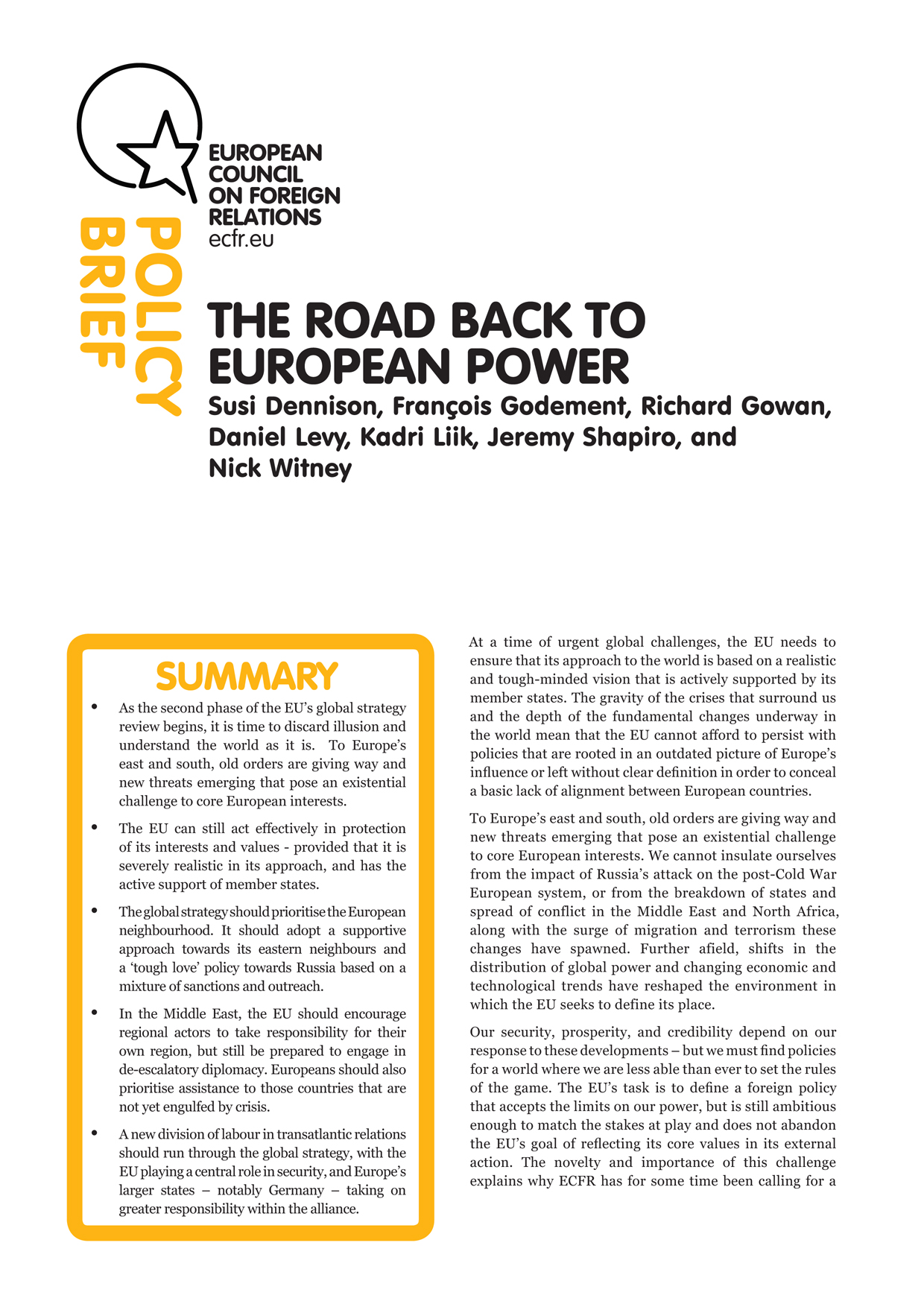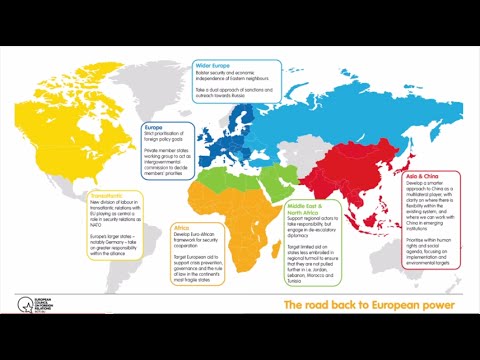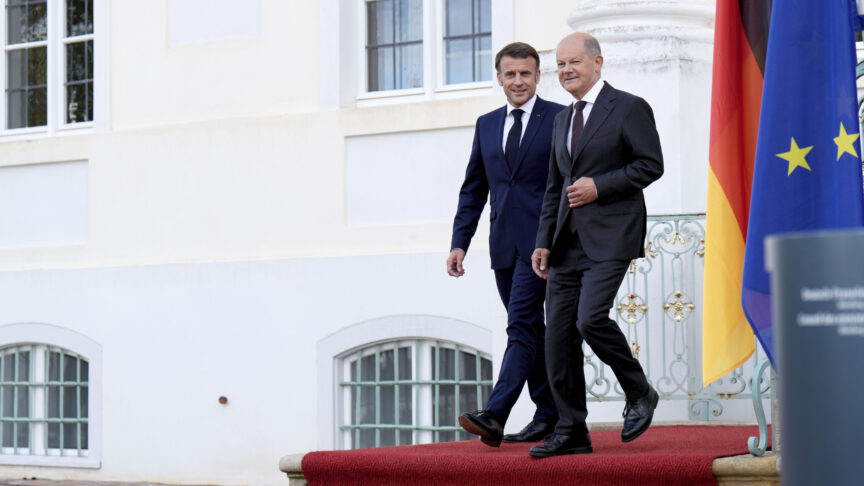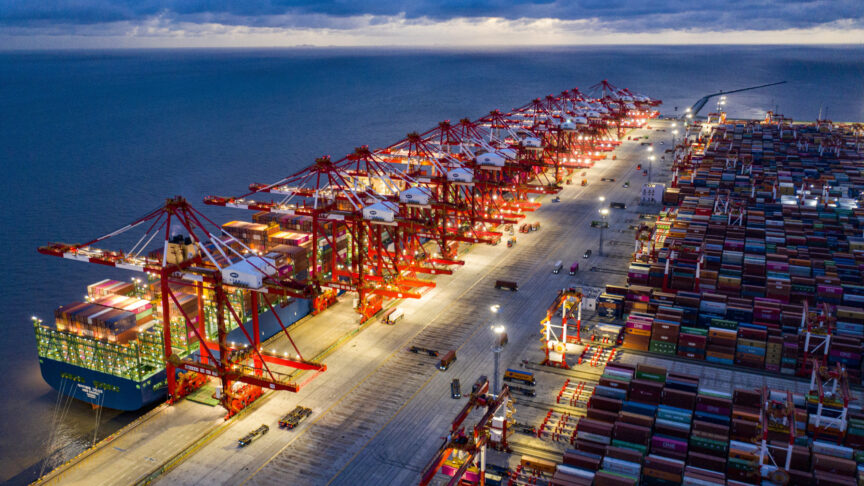The road back to European power
The EU needs an honest assessment of its capabilities and to set limited goals behind which member states can show sustainable unity
The EU needs an honest assessment of its capabilities and to set limited goals behind which member states can show sustainable unity.
“The road back to European power”, is published after the European Council’s green-light for stage two of Federica Mogherini’s global strategy review, a review that ECFR experts support and have long called for. They assert that the EU can still act effectively in protection of its interests and values — provided that it is severely realistic in its approach.
To this end, it recommends a strict prioritisation of the challenges Mogherini highlights in her report, with Russia and the Ukraine conflict and crises in the Middle East and North Africa as immediate priorities. To deal with the potential weaknesses of Europe’s internal dynamics of sometimes coinciding, sometimes clashing national interests, it recommends the creation of a group of member state representatives, who can act as an ‘intergovernmental convention’to map member state interests over the coming year.
The paper also recommends a number of key structural and political changes including:
- a prioritised human rights/rule of law agenda for each regional strategy, and notably with China, in order to ensure the ‘values’ element is a clear part of overall European strategy. Where cooperation is required with violators, the EU should avoid the ‘endorsement trap’ : making clear that while we will need to co-operation will be on a transactional basis
- a new division of labour in transatlantic relations whereby the EU plays as central a role in security relations as NATO, and in which Europe’s larger states – notably Germany – take on greater responsibility within the alliance.
On the eastern neighbourhood and Russia, the paper recommends:
- a supportive approach towards the eastern neighbourhood – bolstering their security and economic independence.
- ‘tough love’ – twin tracks of sanctions and outreach towards Russia, making it clear that we want a functioning long-term relationship but one that doesn’t undermine our values.
On the Middle East and North Africa, the paper recommends:
- supporting regional actors taking responsibility for their neighbourhood, but engage in de escalatory diplomacy where we can add value.
- targeting our limited aid where we can make a difference: on states so far less embroiled in the regional turmoil to ensure that they are not pulled further in i.e. Jordan, Lebanon, Morocco and Tunisia
On Africa, the paper recommends
- developing a Euro-African framework for security cooperation in dealing with terrorist groups.
- targeting European aid to support crisis prevention, governance and the rule of law in the continent’s most fragile states, including Liberia, Sierra Leone and Guinea
Susi Dennison, co-author of “The road back to European power” and co-director of ECFR’s European Power programme, said:
“In 2003, Europe was a success story, epitomised by the famous claim 'Europe has never been so prosperous, so secure nor so free'. The rest of the world seemed anxious to emulate us and liberal democracy looked set to spread around the globe.
“In 2015, such optimism is a distant dream. Beset by economic and political travails, the EU and its member states have become anxious, and introverted. Crises burn on Europe’s borders and policy makers are increasingly aware how much global power has leached away from Europe.
“Europe’s global strategy must reflect this new reality. We cannot go on as we have done, aspiring to a leading role and falling short of this when confronted with our new place in the international system.
“Europe still has a strong range of tools at its disposal – diplomatic, developmental, security and economic – and the possibility of adding more military and cyber capabilities to its arsenal. But it will need all member states to come together, determine their shared priorities and assess the prospects for effective action in order for them to be properly deployed”
The European Council on Foreign Relations does not take collective positions. ECFR publications only represent the views of their individual authors.




